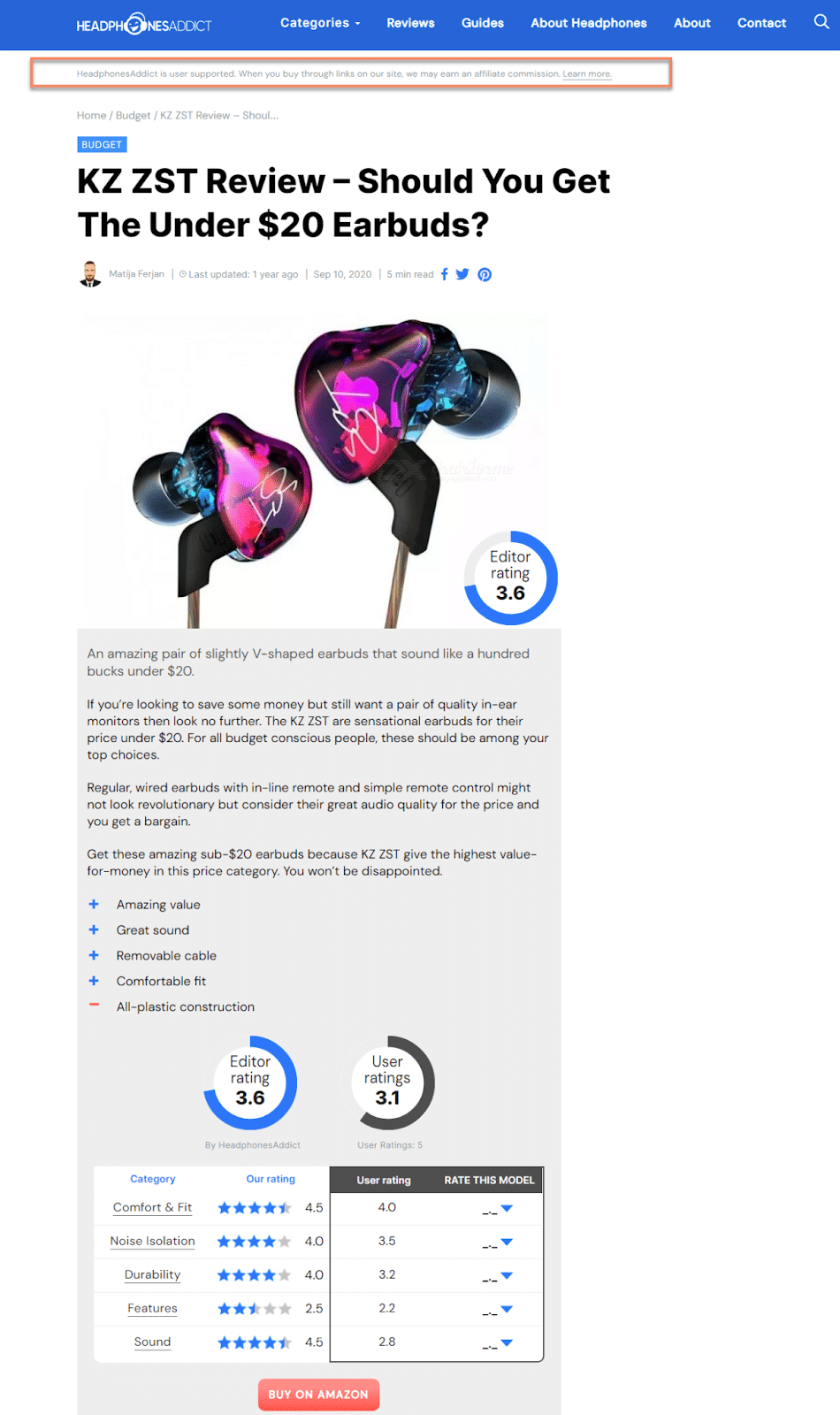Looking for effective strategies to build your brand image and grow your customer base?
Two ways to use advocates to promote your brand are brand ambassador programs and affiliate marketing. But when it comes to brand ambassador vs. affiliate programs, which one is a better fit for your business needs? Or would taking advantage of both be the best growth decision?
To make the right choice, it’s vital to understand how each type of program can contribute to business growth.
How to determine whether brand ambassador marketing or affiliate marketing is best for your business? Learn the differences and similarities here.
How brand ambassador programs work
Brand ambassadors are people handpicked to act as representatives of your brand. They’re already familiar with and use your products and services. But they should also be someone who understands your brand and is a good fit to promote what it stands for.
By reaching out with a formal agreement, a brand ambassador is engaged to promote your products or services on a long-term basis.
It’s important to choose the right people to be your brand ambassadors. They are an extension of your brand, and anything they engage in has a direct bearing on your business image.
Brand ambassadors influence people to purchase your products online. This is usually through their social media platforms, their blogs, or both. But they can also meet and promote to potential customers offline, through in-person events or product launches. During these efforts, they’re primarily focused on building relationships with potential customers, rather than generating the most sales.

PINK campus brand ambassadors host an in-person event at Penn State University, where students can shop on the PINK brand bus.
In some cases, businesses choose people who already have a huge following as their brand ambassadors, such as celebrities, social media stars, or popular bloggers.
But brand ambassadors don’t have to have a large follower count – smaller creators can be ambassadors as well. What matters most is they love your brand, have the skills to promote it online and offline, and are highly trusted by their audience.
Since people trust brand ambassadors, they are likely to follow what they say about a given product. This increases brand awareness and sales, even though sales aren’t their first focus.
How affiliate marketing programs work
Affiliates are website owners, blog owners, or social media personalities responsible for creating digital content to promote your brand and drive sales. Their role is to share your product in their content and convince people to choose your brand through their digital channels.
The right affiliates for your brand should already create content that resonates with your target audience. This way, producing content about your brand will look natural, and will reach those most likely to buy your products.
As they create the content, affiliate marketers include links to your brand’s website, known as affiliate links. Their followers click on those links, land on your website, and ideally make a purchase. When a sale comes from an affiliate link, the affiliate marketer receives affiliate commission.

The HeadphonesAddict website includes an affiliate link to Amazon in this review of earbuds.
An affiliate’s ultimate goal is to drive traffic to your website and generate as many sales as possible through their posts and affiliate links. The more sales they’re responsible for, the more commissions they earn.
Unlike brand ambassadors, who always know and love your brand, affiliates aren’t always familiar with your brand before they start promoting it. Rather, affiliates often choose to promote a brand based on the potential to earn commissions, given that they share an audience with the brand.
Differences between affiliates and brand ambassadors
The brand ambassador vs. affiliate debate has been going on for a while now. In fact, many people still don’t understand the difference between the two.
Here are the distinctions you should know:
Mediums used to share your brand
Affiliate marketers only use digital spaces to promote your brand. They share affiliate links through their platforms, like blogs, websites, and social media. Affiliate links help you track all the sales they make for your business. However, affiliates don’t perform offline brand promotion.
Brand ambassadors also share your brand through their online channels. However, they can do so with or without using sales tracking links to your website. This makes it difficult to track the exact volume of sales you make from a brand ambassador program.
Additionally, ambassadors can promote your brand offline through in-person events:
- Trade shows
- Networking events
- Guerilla marketing
- Product launches
- Store openings
Compensation and rewards
The next point of distinction between brand ambassador vs. affiliate programs is the compensation they receive.
Affiliates are rewarded in the form of cash payments, known as an affiliate commission. The amount could be calculated as a percentage of each sale or a specific amount for each sale.
No matter how affiliate commission is calculated, the more sales and revenue generated through the affiliate link, the greater the compensation for affiliates.
The compensation brand ambassadors receive depends on the agreement with the business. It could be a set salary for their efforts, regardless of the revenue directly attributed to them (similar to an employee salary). They could also receive flat rewards for each promotional task they complete.
In some cases, brand ambassadors accept free products, brand credits, or other incentives. Occasionally, they might be rewarded with sales commissions, but this usually isn’t the case.
Motivations to refer
Since affiliates get paid a commission for every single sale made through their affiliate link, and receive no payment upfront, they’re focused on driving as many sales as possible.
On the other hand, the main aim of a brand ambassador is to build robust relationships between the brand and its existing and potential clients. Authentic relationship-building, and authentic showcasing of how the brand fits into their daily life, is far more important to ambassadors than the sales they help make.
Similarities between affiliates and brand ambassadors
For all the differences between ambassadors vs. affiliates, there are so many similarities. It’s difficult to discuss one aspect and ignore the other. Below are the details you need to understand:
Both harness word of mouth and social proof
Word of mouth is a critical marketing tool. It works even better when someone you trust recommends a product.
Your audience is likely to follow what affiliates and brand ambassadors use, as long as they trust these creators are publishing honest content. As such, these two marketing campaigns are likely to yield better results compared to traditional ads.
Both are effective strategies for growth
The power of word-of-mouth marketing shouldn’t be underestimated. Both affiliates and ambassadors are proven ways to help you grow your customer base and effectively scale.
Both involve careful brand onboarding
When business owners think of ambassador vs. affiliate campaigns, they’re always concerned about what it takes to implement these marketing efforts successfully.
In both cases, the advocate should uphold what the brand stands for. It’s important to tell these advocates what they can and can’t do as they promote your brand.
The reputation of your brand depends on what these advocates do. But as you train them, you still need to give them space. That way, they can promote your specific brand authentically, and give their own perspective of your business.
With the right software, you can run and track both types of campaigns
The right word-of-mouth software can help you run both affiliate and brand ambassador programs. Software helps control any affiliate program data and automatically tracks sales. It can also track a brand ambassador’s efforts, which would otherwise be difficult to monitor.
Referral Rock software is flexible enough to run both types of programs, as well as referral and partner programs.
We make it easy to set up a program without coding, and track your word of mouth, no matter what type of program you choose.
Brand ambassadors vs. affiliates: Which to choose?
The most important part of the affiliate vs. ambassador programs debate is understanding which one you should implement in your business. Your brand needs to stand out if you want to boost revenue and make profits.
Here’s how to know which one will best meet the needs of your business.
| Brand ambassadors | Affiliates | |
| Medium of promotion | Online: Social media or blogs Offline: Trade shows, events, guerrilla marketing |
Online: On their website, social media or blogs |
| Method of promotion | Authentically talk about how they use your products | Place affiliate links in their content |
| Type of compensation | Could be cash, free products, branded swag, store credits, tangible rewards… whatever your brand chooses | Always cash |
| Structure of compensation | Flexible; based on an agreement your brand makes with the ambassador | Paid on every sale |
| Main motivation | Build relationships with your audience | Generate sales |
When to choose a brand ambassador program
Are you looking for representatives who can promote your brand both online and offline? In that case, a brand ambassador program will suit you best. You can pay in cash, free products, or with other types of incentives.
However, the main focus of ambassador marketing isn’t on direct sales. Brand ambassadors also help you build strong relationships with your current and potential customers. And of course, brand ambassadors also still help increase your revenue.
The right brand ambassador software lets you track your brand ambassador marketing and sales efforts – you don’t need to sacrifice tracking just because you pick ambassadors over affiliates.
When to choose an affiliate program
Is your focus on building your brand presence and increasing sales specifically online? If so, then an affiliate program may suit your business.
The strategy works only through online platforms, including social media and blogs. You won’t need to train affiliates as offline brand representatives for events.
However, you need to be comfortable paying commissions every time an affiliate makes a sale, in cash, for the strategy to suit your business.
Affiliate programs also help your business drive sales with minimal risk. The advantage is you only pay the affiliate when you sell a product through their affiliate link – you don’t make an up-front payment. Therefore, this is a cost-effective brand marketing strategy.
With the right affiliate software, you can attain even more success, as you’ll control your data and be able to instantly track where every affiliate sale comes from.
Key takeaways
In the affiliate vs. ambassador discussion, you’ll notice both play important roles in business growth. The main objective is to promote the brand in question.
Although they differ in some aspects, they have several similarities – they harness the power of word of mouth, and software can help you track the effectiveness of both campaigns.
A business can identify its unique position and a strategy that works to its advantage. Besides, you can always choose to use a mix of the two forms of marketing – including with the same software. Contact us to learn more or schedule a demo.



